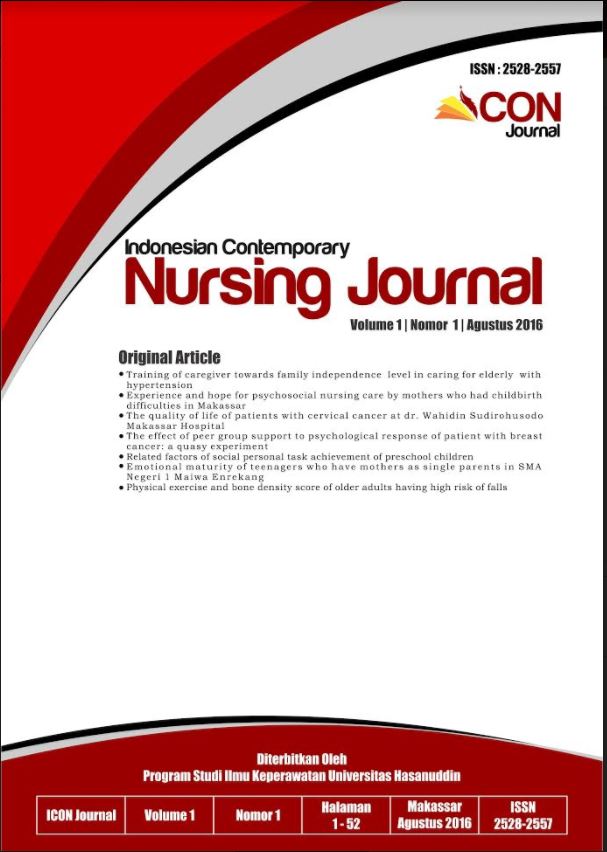Does Self-Stigma Affect Self-Efficacy on Treatment Compliance of Tuberculosis Clients?
Keywords:
Self-Efficacy, Self-Stigma, Treatment Compliance, TuberculosisAbstract
Introduction. TB is a contagious infectious disease that still threatens globally. One of the problems in TB control management is related to the issue of low treatment compliance. Low adherence to medication can be influenced by psychological factors, one of which is self-stigma. Method. This study aims to describe the self-stigma of TB clients and their relationship with self-efficacy in TB treatment compliance. This study used a cross-sectional method. The total sample was 157 people taken by purposive sampling technique at 18 community health centers (Puskesmas) in Jeneponto Regency. Data collection techniques used self-stigma and self-efficacy of TB treatment compliance questionnaires which were given directly to respondents. Then, the researcher used univariate and bivariate analysis in analyzing data. Result. The result of this study shows that 52.4% of respondents with high self-stigma had low self-efficacy of medication adherence. Among respondents with low self-stigma, 23.3% of respondents indicated low self-efficacy of treatment compliance. It means that there is a correlation between self-stigma and self-efficacy of treatmen compliance with p-value 0.001 * (<0.05). TB adult clients who have high self-stigma are 3 times more likely to have low self-efficacy of treatment compliance than TB adult clients who have low self-stigma. Conclusion. The results of this study indicate the need to consider self-stigma factors for TB clients in TB control management regimens, especially in providing informational and emotional support to increase self-efficacy in TB treatment compliance.Downloads
Dimensions
Published
2020-08-31
How to Cite
Akbar, N., Nursasi, A. Y., & Wiarsih, W. (2020). Does Self-Stigma Affect Self-Efficacy on Treatment Compliance of Tuberculosis Clients?. Indonesian Contemporary Nursing Journal (ICON Journal), 5(1), 36-41. https://doi.org/10.20956/icon.v5i1.9645
Issue
Section
ARTICLES
Copyright & Licensing
Authors who publish with this journal agree to the following terms:
Authors retain copyright and grant the journal right of first publication with the work simultaneously licensed under a Creative Commons Attribution License that allows others to share the work with an acknowledgement of the work's authorship and initial publication in this journal.
Authors are able to enter into separate, additional contractual arrangements for the non-exclusive distribution of the journal's published version of the work (e.g., post it to an institutional repository or publish it in a book), with an acknowledgement of its initial publication in this journal.
Authors are permitted and encouraged to post their work online (e.g., in institutional repositories or on their website) prior to and during the submission process, as it can lead to productive exchanges, as well as earlier and greater citation of published work (See The Effect of Open Access).
Authors retain copyright and grant the journal right of first publication with the work simultaneously licensed under a Creative Commons Attribution License that allows others to share the work with an acknowledgement of the work's authorship and initial publication in this journal.
Authors are able to enter into separate, additional contractual arrangements for the non-exclusive distribution of the journal's published version of the work (e.g., post it to an institutional repository or publish it in a book), with an acknowledgement of its initial publication in this journal.
Authors are permitted and encouraged to post their work online (e.g., in institutional repositories or on their website) prior to and during the submission process, as it can lead to productive exchanges, as well as earlier and greater citation of published work (See The Effect of Open Access).

